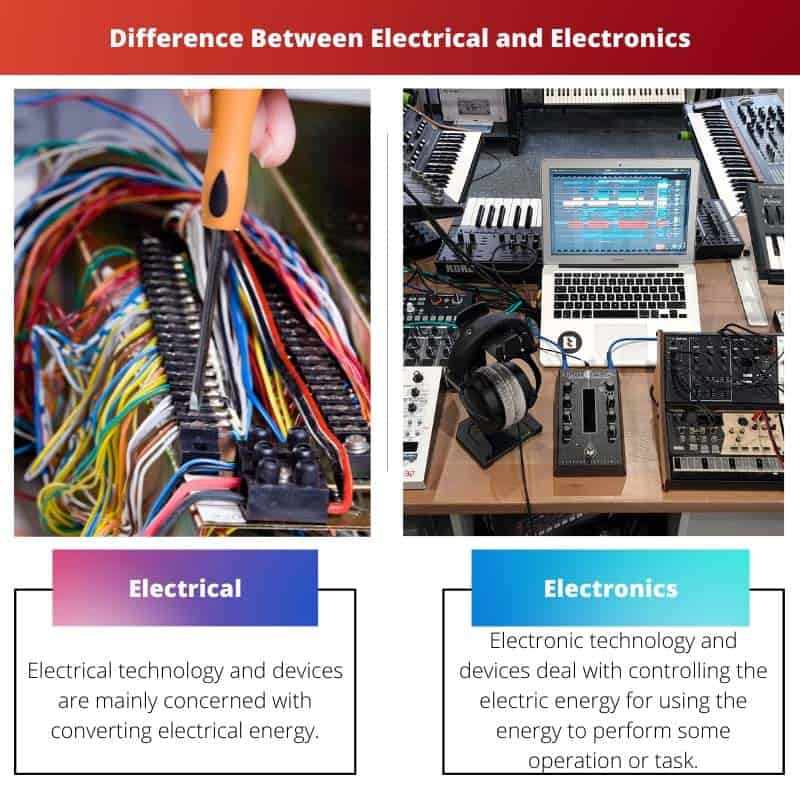Electrical engineering primarily focuses on the study and application of electricity, encompassing the generation, distribution, and utilization of electrical power. This field deals with large-scale power systems, including power plants and transmission lines, as well as the design and implementation of electrical circuits.
In contrast, electronics is a subset of electrical engineering that specifically deals with the control of electric energy through active components such as transistors and semiconductors. Electronics emphasizes the development of devices like computers, smartphones, and electronic systems, delving into the intricacies of circuit design, signal processing, and integrated circuits.
Key Takeaways
- Electrical refers to the study and application of electricity, including power generation, transmission, and distribution. In contrast, electronics refers to studying and applying electronic devices and systems, including semiconductors, microprocessors, and communication systems.
- Electrical and electronics play important roles in modern technology and infrastructure, but their focus and applications differ.
- Electrical engineering requires a strong foundation in mathematics and physics, while electronics engineering requires a strong foundation in circuit theory and semiconductor physics.
Electrical vs Electronics
The difference between Electrical and Electronics is that electrical technology and devices are used to generate or convert electrical energy and also to store this energy. On the other hand, electronic technology and devices deal with using this electrical energy to perform some task or operation. Thus electronic technology deals with the creation of various electronic equipment.

An electrical device is an instrument that operates on electrical power. The main principle of operation of these devices is the conversion of electrical energy into other types of energy.
Electrical devices are used to generate. Convert and store electrical power or electricity for industrial as well as commercial use.
Electronic devices are devices that regulate electrical power to apply the power to perform some task. Thus these devices control the flow of electricity through a circuit.
For the operation of the circuit. These devices do not generate electric power by themselves and thus rely on a constant flow of energy from some other source.
Comparison Table
| Feature | Electrical Engineering | Electronics Engineering |
|---|---|---|
| Focus | Production, transmission, and utilization of electrical power | Control of electrical flow for specific tasks and functionalities |
| Current Type | Primarily deals with Alternating Current (AC) | Mostly deals with Direct Current (DC) |
| Voltage Range | Handles high voltage ratings (110V-220V domestic, up to 400 kV in industries) | Works with lower voltage ratings ( 3V-12V DC) |
| Components | Relies on conductors like copper and aluminum | Utilizes semiconductors like silicon and germanium |
| Device Size | Often involves larger devices like generators, transformers, motors | Deals with smaller, more compact circuits and components |
| Functionality | Converts electrical energy into other forms (heat, light, sound) | Manipulates electrical signals for processing, amplification, or decision-making |
| Complexity | Systems can be complex but follow established principles | Circuits can be highly intricate and involve complex logic operations |
What is Electrical Engineering?
Electrical Engineering is a diverse and dynamic field that involves the study, design, and application of electrical systems. This discipline plays a crucial role in modern technology, encompassing a broad range of topics from power generation to electronic circuits and communication systems.
Core Concepts
1. Circuit Theory
Electrical engineers analyze and design electrical circuits, which are the building blocks of various electronic devices. Concepts such as voltage, current, resistance, and capacitance form the foundation of circuit theory.
2. Electromagnetism
Understanding the principles of electromagnetism is fundamental to electrical engineering. This includes the study of electric and magnetic fields, electromagnetic induction, and the behavior of materials in these fields.
3. Power Systems
Power systems deal with the generation, transmission, and distribution of electrical energy. Electrical engineers in this area focus on optimizing the efficiency, reliability, and sustainability of power networks.
4. Electronics
Electronics involves the design and development of electronic devices and systems. This includes integrated circuits, microprocessors, and other components used in various applications, from consumer electronics to medical devices.
5. Control Systems
Control systems engineering is concerned with designing systems that regulate and control other systems. This includes applications in automation, robotics, and industrial processes.
6. Signal Processing
Signal processing deals with the manipulation and analysis of signals, such as audio, video, and communication signals. Electrical engineers in this field develop algorithms and systems to enhance, compress, or analyze these signals.
Applications
Electrical engineering has widespread applications across various industries, including:
1. Power Generation and Distribution
Electrical engineers contribute to the design and operation of power plants, ensuring a reliable and efficient supply of electricity to homes, businesses, and industries.
2. Telecommunications
In the field of telecommunications, electrical engineers work on designing and optimizing communication networks, developing wireless technologies, and improving data transmission systems.
3. Electronics and Computer Systems
The development of electronic devices, computers, and embedded systems relies heavily on electrical engineering expertise. Engineers in this area work on innovations such as smartphones, computers, and wearable technology.
4. Renewable Energy
With a growing focus on sustainability, electrical engineers contribute to the design and implementation of renewable energy systems, such as solar and wind power.
5. Biomedical Engineering
In the healthcare sector, electrical engineers collaborate on the development of medical devices, diagnostic equipment, and technologies that improve patient care.
Education and Career Paths
To become an electrical engineer, individuals pursue a bachelor’s degree in electrical engineering or a related field. Advanced degrees, such as a master’s or Ph.D., can open doors to research positions and leadership roles. Career opportunities for electrical engineers exist in industries like power, electronics, telecommunications, and more.

What is Electronic Engineering?
Electronic Engineering, also known as Electrical and Electronic Engineering, is a branch of engineering that deals with the study and application of electricity, electronics, and electromagnetism. It encompasses a wide range of technologies, from traditional electrical power systems to modern electronics and communications.
Core Concepts
1. Electricity and Magnetism
At the foundation of electronic engineering lies the understanding of electricity and magnetism. Engineers in this field work with principles such as Ohm’s Law, electromagnetic induction, and Maxwell’s equations to design, analyze, and troubleshoot electronic systems.
2. Circuit Theory
Circuit theory is a fundamental aspect of electronic engineering, involving the study of electrical circuits and their components. Engineers use this knowledge to design and analyze circuits, ensuring proper functionality and efficiency.
3. Electronics
Electronics focuses on the design and development of electronic devices and systems. This includes components such as transistors, diodes, and integrated circuits, as well as the design of electronic circuits for various applications.
Applications
1. Power Systems
Electronic engineers play a crucial role in the design and maintenance of power systems, ensuring the efficient generation, transmission, and distribution of electrical energy. This includes renewable energy sources, smart grids, and power electronics.
2. Communication Systems
Communication systems involve the transmission of information through various channels. Electronic engineers contribute to the development of technologies like wireless communication, satellite systems, and fiber optics, enhancing global connectivity.
3. Control Systems
Control systems are essential for regulating and managing various processes. Electronic engineers design control systems for applications such as robotics, automation, and industrial processes, ensuring precision and stability.
4. Signal Processing
Signal processing involves the manipulation and analysis of signals, such as audio, video, and data signals. Electronic engineers work on developing algorithms and technologies for tasks like image processing, audio enhancement, and data compression.
Emerging Technologies
1. Internet of Things (IoT)
The IoT involves connecting everyday devices to the internet to enable communication and data exchange. Electronic engineers contribute to the development of IoT devices and networks, creating a more interconnected and automated world.
2. Artificial Intelligence (AI)
The integration of artificial intelligence in electronic systems is a rapidly growing field. Electronic engineers work on designing hardware that can support AI algorithms, enabling applications like machine learning and computer vision.
Education and Career
1. Education
To become an electronic engineer, individuals pursue a bachelor’s degree in electrical or electronic engineering. Advanced degrees, such as master’s or Ph.D., can open doors to specialized research and development roles.
2. Career Opportunities
Electronic engineers find employment in various industries, including telecommunications, energy, aerospace, and manufacturing. They work in roles such as design engineers, project managers, and research and development specialists.

Main Differences Between Electrical and Electronic
- Scope of Study:
- Electrical: Primarily deals with the study and application of electrical systems, including power generation, transmission, and distribution.
- Electronic: Focuses on electronic circuits, devices, and systems, emphasizing the use of semiconductor components.
- Components and Systems:
- Electrical: Involves components such as transformers, generators, and motors, and systems related to power generation and distribution.
- Electronic: Involves components like transistors, diodes, and integrated circuits, and systems related to signal processing, communication, and control.
- Signal Type:
- Electrical: Deals with the flow of electrical power, characterized by voltage and current.
- Electronic: Involves the manipulation of electrical signals, in the form of voltage or current variations, for information processing and control.
- Applications:
- Electrical: Applied in power generation plants, electrical grids, and various industrial applications.
- Electronic: Applied in areas such as telecommunications, information technology, consumer electronics, and automation.
- Energy Handling:
- Electrical: Involves the generation, transmission, and distribution of large amounts of electrical power.
- Electronic: Typically deals with lower power levels and focuses on information processing, control, and communication.
- Circuit Complexity:
- Electrical: Circuits are simpler and involve basic electrical components.
- Electronic: Circuits can be more complex, incorporating integrated circuits and digital components.
- Key Components:
- Electrical: Emphasizes components like resistors, capacitors, and inductors.
- Electronic: Emphasizes semiconductor devices such as transistors and diodes.
- Control and Automation:
- Electrical: Primarily used for power control and distribution.
- Electronic: Integral to automation and control systems, enabling precise manipulation of signals for various applications.
- Examples:
- Electrical: Power lines, electric motors, transformers.
- Electronic: Computers, smartphones, radios, and digital cameras.

- https://books.google.co.in/books?hl=en&lr=&id=1lR701DFtaMC&oi=fnd&pg=PA1&dq=electrical+technology&ots=9ZdkQCj57K&sig=u3nXES5OO6eFOXPXcfEne1QiR5k
- https://siarchives.si.edu/collections/siris_sic_12464
- https://jamanetwork.com/journals/jama/article-abstract/196876
- https://bmcmedinformdecismak.biomedcentral.com/articles/10.1186/1472-6947-13-95



